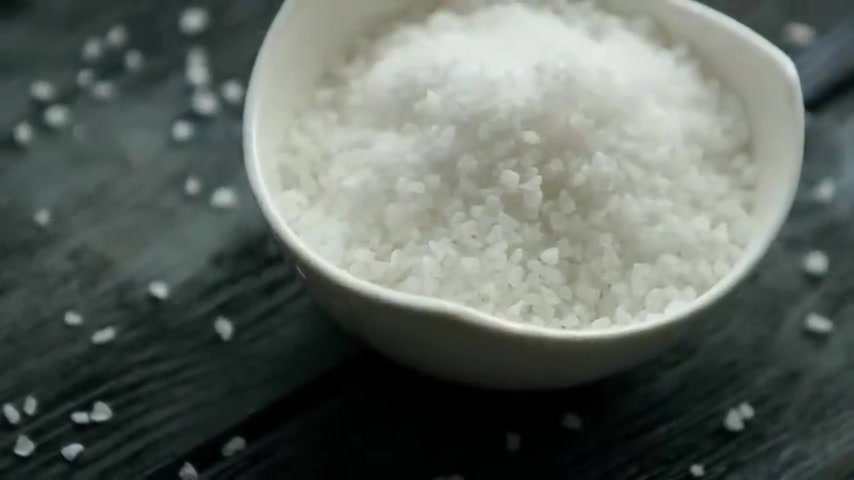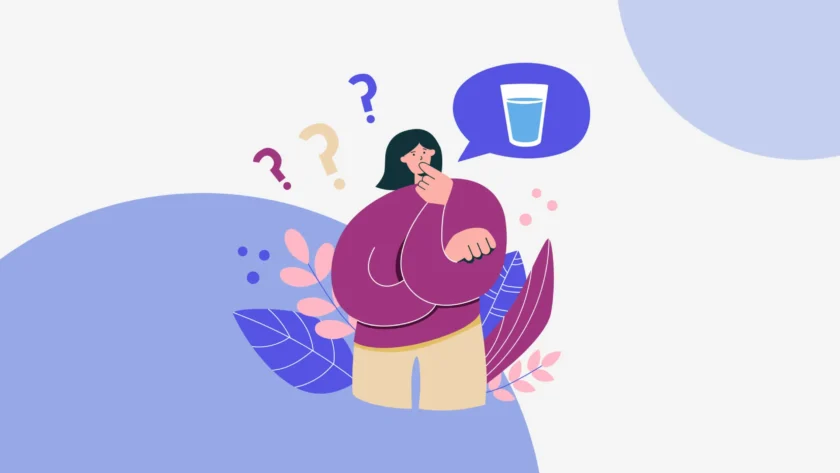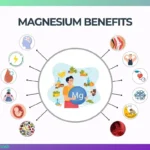Table of Contents
How much water should you drink while fasting?
– Recommended intake: 2-3 liters (8-12 cups) of water per day
– This is more than when not fasting
Why do you need to drink more water during fasting?
– Fasting leads to glycogen loss, which causes fluid loss
– Fluid loss includes water and electrolytes
– Adequate hydration prevents kidney stones
What should you add to your water while fasting?
– Electrolytes
– Sea salt (1/8 teaspoon per liter)
– Potassium and magnesium supplements
How much sea salt should you consume daily?
– 1 to 1.5 teaspoons per day
– More if you work out or sweat a lot
The supplements are recommended
– Greens powder (e.g., wheatgrass juice powder)
– Helps offset acidity during fasting
– Beneficial for those prone to gout
The benefits of proper hydration during fasting
– Prevents kidney stones
– Helps avoid keto fatigue and weakness
– Maintains electrolyte balance
So let’s dive into the details…
Alright, let’s chat about something that’s probably on your mind if you’re into fasting or thinking about giving it a go – drinking water while fasting. I know, I know, it might sound a bit confusing at first. You’re fasting, so can you even drink anything?
Well, grab a glass of water (spoiler alert: you can drink it!), and let’s dive into this together. First things first, whether you’re doing a quick intermittent fast or going for a longer stretch, staying hydrated is super important. Trust me, your body will thank you! We’re going to explore all the ins and outs of sipping that good ol’ H2O while you’re fasting.
I’ll share some friendly advice on how much to drink, when to drink it, and why it’s so crucial. We’ll also chat about the different types of fasting and how water fits into each one. Don’t worry, I’ll keep it light and easy to understand – no fancy jargon here! So, ready to become a pro at balancing your water intake with your fasting goals? Let’s get started on this hydration journey together!
Fasting and Water Intake

So I wanted to create this topic just to talk about how much water you should drink. I had some previous videos that talked about only drinking when you’re thirsty, and that could be like one cup a day.
But when you’re fasting, you need to be drinking more water than when you’re not fasting. The reason for that is that you’re losing a good amount of your glycogen, especially if you’re fasting over a period of time.
You’re doing prolonged fasting, 48, 72 hours, you’re going to lose your glycogen, and with the glycogen loss, which is your stored sugar, you’re also going to lose a ton of fluid.
- Important points:
- When fasting, you need to drink more water than when not fasting.
- Losing glycogen leads to loss of fluid, including water and electrolytes.
- Prolonged fasting can lead to significant fluid loss.
How Much Water Should You Drink While Fasting?

And the reason for that is that you’re losing a good amount of your glycogen, especially if you’re fasting over a period of time.
You’re doing prolonged fasting, 48, 72 hours, you’re going to lose your glycogen, and with the glycogen loss, which is your stored sugar, you’re also going to lose a ton of fluid. I say fluid because it’s not just water, it’s a combination of water and electrolytes and salts.
So you need to put that back. The amount of water that I’m going to recommend is between two to three liters a day.
- Important points:
- Recommended water intake is 2-3 liters per day.
- This amount helps prevent kidney stones.
- Fluid loss includes water, electrolytes, and salts.
Preventing Kidney Stones and Maintaining Electrolyte Balance

And this will also prevent kidney stones because the cause of kidney stones is a super saturated urine that then you start forming this crystal out of calcium oxalate stones.
But if you have enough fluid, they won’t get that concentrated. So two to three liters of water is 8 to 12 cups of water. I recommend putting in electrolytes and sea salt. Don’t forget the sea salt, a lot of times people forget that and they wonder why they’re tired.
You need both a good amount of potassium and magnesium and sea salt to prevent keto fatigue, keto flu, and overall weakness.
- Important points:
- Drinking enough water helps prevent kidney stones.
- Electrolytes and sea salt are essential for maintaining balance.
- Potassium, magnesium, and sea salt help prevent keto fatigue and weakness.
Maintaining Potassium and Magnesium Levels
Now a lot of people are doing my electrolytes, it has a thousand milligrams of potassium, and if they do my electrolytes without adding sea salt, they might end up with a salt deficiency and feel weaker.
So one thing I do in the morning is I’ll take about a liter of water, I’ll take all my supplements, I’ll add a scoop of this, and I will also add some more sea salt, probably 1/8 of a teaspoon, I will dissolve it in there.
- Important points:
- Electrolytes with high potassium and magnesium are essential.
- Adding sea salt is crucial to prevent salt deficiency.
- Maintaining potassium and magnesium levels is important for overall health.
The Importance of Sea Salt

Now the reason why I formulated this with high amounts of potassium, magnesium, and just a little bit of calcium with a very low amount of salt is because the average person starting keto is very heavy on sodium, very low in potassium.
So it helps to rebalance them. But as you start doing keto, when you start eating healthy, you just don’t want to forget about the sea salt. I do have a sport electrolyte for more salt, but the point is, when you do fasting and keto, you need to keep your potassium and magnesium high as well as your sea salts.
- Important points:
- Sea salt is essential for maintaining electrolyte balance.
- Average person starting keto is often low in potassium and high in sodium.
- Rebalancing electrolytes is crucial for overall health.
Additional Tips and Recommendations
And I want to make a point about that because most people do not add enough sea salt. You need between one to one and a half teaspoons every single day.
If you work out, you need a lot more, so it really depends on yours, how much you sweat. I also add a greens powder, the wheatgrass juice powder, one scoop in that drink, simply because when you’re doing fasting,
you are going to become more acidic, you’re going to be in more deeper ketosis, and the green powder tends to be more alkaline and offset that acidity.
- Important points:
- Adding sea salt is essential, aim for 1-1.5 teaspoons per day.
- Greens powder helps offset acidity and maintain alkalinity.
- Adjust sea salt intake based on individual needs and activity level.
Summary
- When fasting, you’re losing glycogen. With the glycogen loss (stored sugar), you’re also going to lose a lot of fluid. This fluid isn’t just water. It’s a combination of water, electrolytes, and salts—which need to go back into the body.
- I think it would be a good idea for someone to consume between 2-3 liters of water per day while fasting. This could also help prevent kidney stones.
- You would want to be sure to add in electrolytes and sea salt. Forgetting electrolytes and sea salt can potentially lead to keto fatigue, keto flu, and overall weakness. Many people really forget about sea salt. I believe a person should have between 1-1.5 teaspoons of sea salt every day. If you work out, you may need more.
DATA
https://www.ncbi.nlm.nih.gov/pmc/articles/PMC8369953
FAQ
How much water should I drink a day while fasting?
During fasting, it’s recommended to drink 2-3 liters (8-12 cups) of water per day. This is more than usual due to the loss of fluids from glycogen depletion. Adding electrolytes and a small amount of sea salt (1/8 teaspoon per liter) can help maintain proper hydration and prevent fatigue.
What are the fasting rules for water?
Water is generally allowed during most types of fasting, including intermittent fasting and extended fasts. However, the rules may vary depending on the specific type of fast:
- For intermittent fasting: Plain water is always allowed during fasting periods.
- For extended water fasts: Only water is consumed, sometimes with added electrolytes.
- For religious fasts: Rules may vary, but many allow water consumption.
Always consult with a healthcare professional before starting any fasting regimen.
How much weight will I lose on a 3 day water fast?
Weight loss during a 3-day water fast can vary greatly between individuals, typically ranging from 2-10 pounds. However, much of this is water weight and will likely be regained once normal eating resumes. It’s important to note that fasting for weight loss should be approached cautiously and under medical supervision.
Is a 72 hour water fast safe?
A 72-hour water fast can be safe for some healthy individuals, but it carries risks and should only be done under medical supervision. Potential risks include:
- Dehydration
- Electrolyte imbalances
- Low blood sugar
- Fatigue and dizziness
People with certain medical conditions, pregnant women, and those with a history of eating disorders should avoid extended fasting.
Can you drink water when fasting spiritually?
The rules for spiritual fasting vary depending on religious or personal beliefs. Some spiritual fasts allow water, while others don’t. For example:
- Islamic Ramadan fasting: No water during daylight hours
- Some Christian fasts: Water is often allowed
- Jewish Yom Kippur fast: No water for 25 hours
Always follow the guidelines of your specific spiritual practice or consult with a religious leader.
Signs to stop water fasting
It’s crucial to listen to your body during a water fast. Stop fasting and seek medical attention if you experience:
- Severe weakness or dizziness
- Rapid heartbeat or chest pain
- Severe headache
- Fainting or loss of consciousness
- Signs of dehydration (dark urine, dry mouth, extreme thirst)
- Persistent nausea or vomiting
30 day water fasting
A 30-day water fast is an extreme form of fasting that carries significant health risks and should not be attempted without close medical supervision. Potential risks include severe nutrient deficiencies, muscle loss, and organ damage. Most health professionals do not recommend fasts longer than a few days.
7 day water fasting
A 7-day water fast is a prolonged fast that should only be undertaken under strict medical supervision. While some people report benefits, it carries risks such as:
- Electrolyte imbalances
- Dehydration
- Nutrient deficiencies
- Muscle loss
Always consult with a healthcare provider before attempting any extended fast.
Water fasting benefits
Some potential benefits of water fasting include:
- Autophagy (cellular cleanup process)
- Improved insulin sensitivity
- Reduced inflammation
- Potential weight loss
- Lowered blood pressure
However, these benefits are often short-term and more research is needed. The risks of extended fasting may outweigh the benefits for many people.
3 day water fast benefits
A 3-day water fast may offer benefits such as:
- Increased autophagy
- Temporary weight loss
- Possible improvements in insulin sensitivity
- Potential reduction in inflammation
However, these benefits are not guaranteed and may be outweighed by risks for some individuals. Always consult a healthcare provider before attempting a 3-day fast.
Can you drink water while intermittent fasting?
Yes, drinking water is allowed and encouraged during intermittent fasting. Water helps maintain hydration without breaking the fast. You can also consume other non-caloric beverages like black coffee or unsweetened tea during fasting periods.
Is it OK to drink water while fasting for blood test?
For most blood tests, it’s generally okay to drink water while fasting. However, the specific rules can vary depending on the type of blood test. Always follow the instructions provided by your healthcare provider or the lab. If you’re unsure, it’s best to ask your doctor or the lab technician for clarification.




